
So Abercrombie & Fitch is at it again or I should say has been at it for a  while-practicing bias against those who “don’t look the part” of mainstream White American society. In Tulsa, Oklahoma, a college age Muslim girl who wears a hijab is filing suit against the retail store for not hiring her because she would violate the “Look Policy”.
while-practicing bias against those who “don’t look the part” of mainstream White American society. In Tulsa, Oklahoma, a college age Muslim girl who wears a hijab is filing suit against the retail store for not hiring her because she would violate the “Look Policy”.
What is Abercrombie & Fitch’s “Look Policy”? The policy jargon aside, the bottom-line for this retail store is that hijab’s aren’t “sexy” because mainstream White America doesn’t view them that way and only sex sells.
Now of course Abercrombie & Fitch will not outright say that; though I am sure they will fight to preserve this “status quo” through legal, “objective” and “logical” means. It also seems like the very legal right that is supposed to protect religious freedom will be used to defend Abercrombie’s stance. Title VII of the Civil Rights Act of 1964 prohibits religious discrimination. The 197 amendment to Title VII defines religion to,
“… include all aspects of religious observance and practice, as well as belief, unless an employer demonstrates that he is unable to reasonably accommodate an employee’s or perspective employee’s religious observance or practice without undue hardship on the conduct of the employer’s business”.
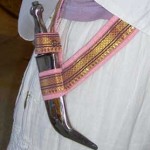 The California legislator has unanimously passed a Kirpan Education Bill (AB 504) through both houses (Assembly & Senate); it is now headed to Governor Schwarzenegger’s desk. This bill, carried by Assemblymember Warren Furutani (D-Long Beach) and other co-sponsors, will only become law if the California Governator signs off on it. AB 504 is a historic bill because it is the only piece of legislation in America that focuses on Sikhs and our kirpan. Furthermore, the bill is being pushed through the law-making process in California-a state with the oldest and largest number of Sikhs in America.
The California legislator has unanimously passed a Kirpan Education Bill (AB 504) through both houses (Assembly & Senate); it is now headed to Governor Schwarzenegger’s desk. This bill, carried by Assemblymember Warren Furutani (D-Long Beach) and other co-sponsors, will only become law if the California Governator signs off on it. AB 504 is a historic bill because it is the only piece of legislation in America that focuses on Sikhs and our kirpan. Furthermore, the bill is being pushed through the law-making process in California-a state with the oldest and largest number of Sikhs in America.
The Kirpan Education Bill (AB 504) requires that all California law enforcement officers be trained on Sikhs and our kirpan. This training would teach California law enforcement officers about Sikhs and the importance of our religiously mandated articles of faith. Sikhs wearing a kirpan are often disrespectfully approached by law enforcement officers and arrested for concealed weapons charges. Often law enforcement officers will pull Sikhs over for minor traffic violations or safety concerns and as soon as officers see the kirpan the situation is escalated into a criminal offense; although the Sikh was only practicing his/her faith. These officers are unaware that the kirpan is a religious mandated article of faith-a gift from our Guru that we wear with care, respect, and love.
It used to be the case that women who came to the US as dependents on their husbands’ immigration status were  sometimes caught between a rock and a hard place. In cases where one spouse was abusive, the other spouse wouldn’t leave the relationship for fear of losing their immigration status and being sent back to their original country. If they returned to their original country empty handed and without their spouses, they would be perceived as failures. And so, many women have just endured extremely abusive relationships.
sometimes caught between a rock and a hard place. In cases where one spouse was abusive, the other spouse wouldn’t leave the relationship for fear of losing their immigration status and being sent back to their original country. If they returned to their original country empty handed and without their spouses, they would be perceived as failures. And so, many women have just endured extremely abusive relationships.
One option that has been available if the abuser is a permanent resident or a US citizen is a self-petition under the Violence Against Women Act. But this wasn’t available if the abuser was in the US on a temporary visa, as many immigrants initially are, or to women outside the US.
Thus, a recent development in asylum law has the potential to open a door to safety for at least some women who are most seriously abused in domestic violence. To qualify for asylum (or refugee status), one must have been a victim of persecution, or have a well founded fear of persecution based on their race, nationality, religion, political opinion, or “membership in a particular social group.” Before this summer, women who were victims of horrendous domestic violence were not recognized as a particular social group, though the issue has been argued for 14 years in a battle to allow battered women to seek asylum in the US. [link]
The government’s prior position under the Bush administration was illustrated in the case of R-A-, a woman who suffered horrific violence at the hands of her husband, a former soldier of the Guatemalan army. She was kicked, whipped, and beaten unconscious, nearly had an eye pushed out, was repeatedly raped, sodomized, threatened with machetes and guns, dragged by her hair, and had windows and mirrors broken on her head. [source 1, 2]. The Guatemalan police refused to help each time she went to them, deciding that hers was a domestic matter. RA fled Guatemala and her husband, seeking asylum in the US.
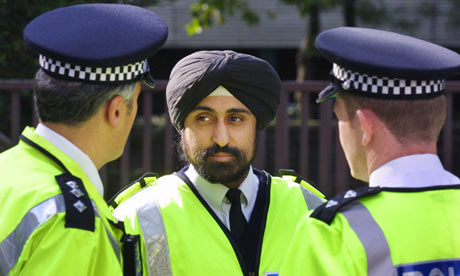 Sikh victims of crime will now be given the option of requesting a Sikh police officer to work on their case. Well, in London at least. The goal of this new service, offered by the Metropolitan Police, is to make use of the “special” knowledge officers have in regards to Punjabi culture to help address issues such as forced marriage and honor crimes. Many police officers believe that crimes have gone unreported and unsolved within the Punjabi Sikh community due to a lack of cultural understanding by police officers from a “white” background.
Sikh victims of crime will now be given the option of requesting a Sikh police officer to work on their case. Well, in London at least. The goal of this new service, offered by the Metropolitan Police, is to make use of the “special” knowledge officers have in regards to Punjabi culture to help address issues such as forced marriage and honor crimes. Many police officers believe that crimes have gone unreported and unsolved within the Punjabi Sikh community due to a lack of cultural understanding by police officers from a “white” background.
Palbinder Singh, chairman of the Metropolitan Police Sikh Association (MPSA) said: “It’s about understanding and appreciating difference. I don’t believe a white officer is ever going to be fully conversant with a Sikh for example. We have got evidence in the most serious type of crimes where Punjabi culture itself is the issue, that they haven’t been properly investigated.” [link]
Cringe.
When the British Sikh Police Association (BSPA) was set up, a spokesman suggested that the organization represented an important move towards social cohesion and integration, just like ‘other support networks within the police’. The BSPA did an excellent job at setting up an online service to allow women to report honor-based violence. It’s a completely valid effort to address the needs of minority communities – and something which should be celebrated. However, while I am a huge advocate for providing culturally and linguistically relevant services in all public sectors, I’m not sure that the solution proposed by the Metropolitan Police in England is necessary a good thing. Instead of providing diversity training to all members of the police force, this policy divides justice across ethnic lines.
Oregon recently passed a bill to repeal its ban on religious attire in the workplace, a policy adopted 100 years ago as part of anti-Catholic backlash. However, it let stand an exception to this act — specifically, it continues to ban wearing “religious attire” in classrooms. Its decision strikes against its stated policy goal: to ameliorate religious discrimination in the workplace.
Religious affiliation is a protected class under U.S. equal protection (14th Amendment) and Civil Rights law, but it is subject to a much more lenient standard of review than other forms of discrimination (e.g., race). In 1980, the Supreme Court upheld Oregon’s workplace ban. The Legislature supports its ban by claiming that it is designed to avoid proselytization in the classroom. This is both misguided and continues to advance discrimination.
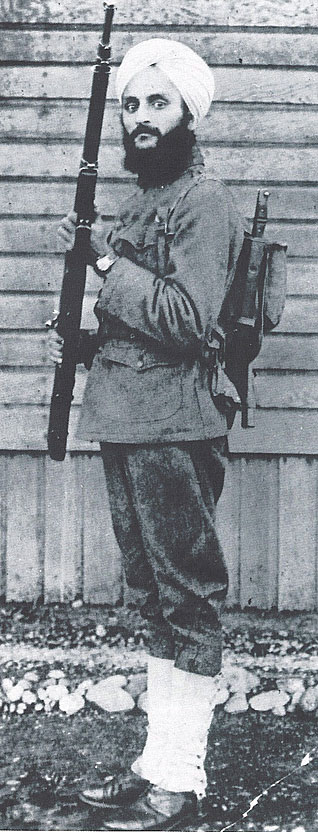 The Sikh Coalition recently announced that three Congressional representatives from New York and New Jersey wrote to Defense Secretary Robert Gates on behalf of their Sikh constituents regarding the Coalition’s “Right To Serve” campaign.
The Sikh Coalition recently announced that three Congressional representatives from New York and New Jersey wrote to Defense Secretary Robert Gates on behalf of their Sikh constituents regarding the Coalition’s “Right To Serve” campaign.
In their letters, Congresswoman Carolyn Maloney, Congressman Rodney Frelinghuysen and Congressman Joseph Crowley asked Secretary Gates to allow Sikh soldiers to serve with their articles of faith intact. The letters cited other Sikhs’ service in the US Armed Forces and in our allies’ militaries to support their argument that these men should be permitted to serve.
This an important milestone in what is likley to be a long and difficult process. In reference to this, I’d like to share a piece I wrote on sikhchic.com shortly before the launch of this campaign, titled – This We’ll Defend [The motto on the official seal of the United States Army. ]
Last fall, I went to an NFL game to watch my team face their arch rival on Sunday Night Football. As we were watching the pre-game warm-up, the gentleman next to me asked “So what do they think of football in your country?” I paused, and politely replied “Well, considering my country is America…we think pretty highly of it.” He attempted to re-phrase his question and after a few awkward exchanges, I yielded, and answered “Oh…you mean my ancestors, they are from Punjab…I’m not sure what Punjabis think of football.” We changed the topic to the upcoming game and ended our conversation.
I run in to these dialogues a lot. As I’ve gotten older, the occasional taunts and racial slurs I receive due to my articles of faith no longer faze me. I can always blame that on ignorance and lack of education. But the exchange like the one at the football game unsettles me. They are typically with people who are both educated and polite, but it is their perception that is troublesome…their presumption, that because of the way I look…I am not an American.
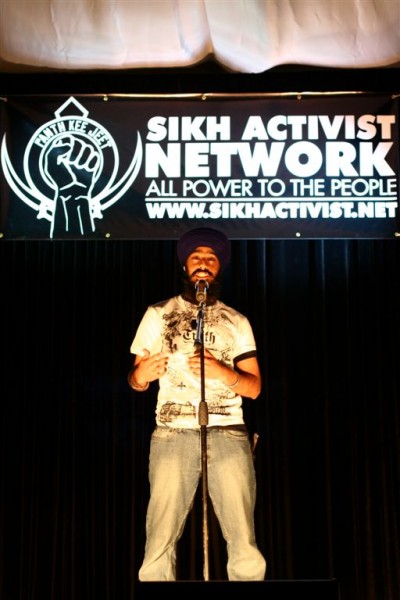
It is often said that a revolution begins not with the sword but with the pen. However, last Friday night in a packed banquet hall in the Toronto suburb of Malton, I witnessed a revolution begin with the microphone.
At an event entitled “When Lions Roar”, fantastically organized by the Sikh Activist Network, one young artist after another got on to the mike and paid homage to the lives destroyed in 1984. I was blown away by the talent and passion displayed by the performers. Through the art of spoken word, music, and action, each of the 26 acts put a different face on the impact of June 1984. They were all unique in their perspective, but all shared one common thread: 1984 is just too important to forget.
Over 1000 people gathered to attend the 4+ hour event. They covered the entire spectrum of Sikh life. This was not your typical retreat and kirtan crowd. In fact, the diversity of performers and audience has challenged me to rethink my stereotypes about who cares about 1984 and the future of the Sikh panth. Individuals that I would have never suspected of having even a passing interest in Sikhi or the Sikh community, would come up to the mike and speak with such energy, insight and emotion. They often reduced me to tears. And most amazing was the fact that almost all of them weren’t even alive in June 1984.
For a thirty-something guy like me who has always considered myself part of the “youth”, it was indeed a little bit humbling to realize that, while I’d probably still be the youngest guy at a Youth Akali Dal meeting, I’m now probably a generation or two above the youngest Sikh leaders. Which means me and my fellow Generation X-ers need to spend less time trying to do it all ourselves, and more time using our resources to enable the next wave of younger Sikhs to establish their own voice and institutions. We were the first generation coming through the diaspora, with little support from our elders. However, we can make it easier on our younger brothers and sisters. We can provide them seed funding to start their dreams, connect them those that can help them along the path, and help coach them through their challenges.
As you’ll see from the videos and photos, the next generation has indeed stepped up, their language of change is hip-hop and I think they’re gonna be alright.
Click through for videos and pictures.
 As talking heads buzzed with news of President Obama’s nomination of Sonia Sotomayor to the Supreme Court, there has also been a flurry of commentary. Is her selection tokenizing? Is it triumphant? Is she smart enough? Is she nice enough? I don’t think it’s particularly useful to parse the commentary on Judge Sotomayor specifically — a lot of the back and forth parallels and reproduces the tropes that come out in any discussion addressing privilege and remediation.
As talking heads buzzed with news of President Obama’s nomination of Sonia Sotomayor to the Supreme Court, there has also been a flurry of commentary. Is her selection tokenizing? Is it triumphant? Is she smart enough? Is she nice enough? I don’t think it’s particularly useful to parse the commentary on Judge Sotomayor specifically — a lot of the back and forth parallels and reproduces the tropes that come out in any discussion addressing privilege and remediation.
The same day, a relatively lengthy commentary previewed on NPR’s morning edition. It argued that while Obama’s nomination was a triumph (if successful, Sotomayor will be the first woman of color and first Latina on the Court), the President should examine other forms of diversity on the bench. Specifically, he should appoint an LGBT Justice, next.
The recent caste-based violence in a Vienna and Punjab has shown us the horrible consequences of casteism. Sathnam Sanghera recently did a short report, “Caste Matters”, which investigates the possibility of legally outlawing caste-based discrimination in the UK.
Often we think caste-based discrimination is a 1st generation issue that becomes diluted in the Diaspora. However, CasteWatchUK has anecdotal evidence to show otherwise. They have lobbied to include caste-based discrimination as part of a stream-lined single equality act that would go into effect in 2010. If the group provided research evidence that caste-based discrimination existed in areas managed by the government, such as jobs and social services, then caste would be added to the equality act along with race, religion, and sexual orientation. However, this evidence has yet to be provided, aside from anecdotal examples from the work-place. The lack of aggregate evidence is only due to a lack of investigative research, as the anecdotal cases prove that it is indeed occurring.
You can listen the BBC Asian Network Report here.
Let’s us know what you think. Do you think caste-based discrimination should be included in equality acts in the Diaspora, such as the UK, USA, and Canada? If so, why?
 Rice University senior, Sukhdeep Kaur, has received the Roy and Hazel Zeff Memorial Fellowship – a $25,000 grant, which will allow her to study issues of human rights and access to justice in areas around the world. The news release states:
Rice University senior, Sukhdeep Kaur, has received the Roy and Hazel Zeff Memorial Fellowship – a $25,000 grant, which will allow her to study issues of human rights and access to justice in areas around the world. The news release states:
A political science and policy studies major with a focus on law and justice, Kaur has a longstanding interest in human rights and justice issues that stems from the violent history between the Indian government and Sikhs in Punjab.
For her fellowship, Kaur will travel to four countries — Chile, Rwanda, Israel and France — to work with minority populations on the issues of access to human rights and justice.
I recently interviewed Sukhdeep and we discussed how she first got involved with human rights. “I knew I wanted to work with law and justice but wasn’t really sure whether to focus on civil rights or human rights,” Kaur said. However, after taking a human rights course her sophomore year and her personal study of the violence toward Sikhs in India in 1984 and subsequent human rights violations, she decided to make this the focus of her field work.
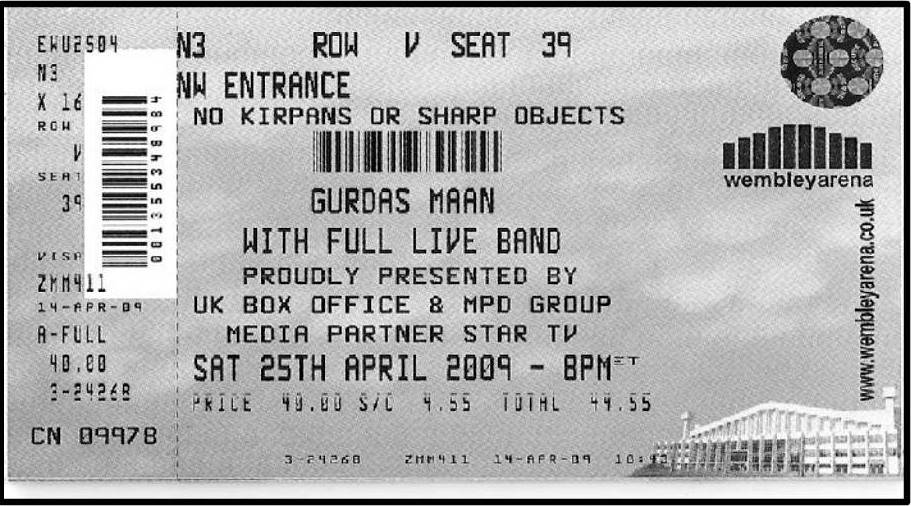
Vaisakhi in the diaspora usually brings two things to those living in cities with large Sikh communities: Nagar Kirtans and Vaisakhi concerts. Unfortunately, if you were an Amritdhari Sikh in London this year and you wanted to partake in both, you would have been out of luck. Tickets for the recent Gurdas Maan concert held at Wembley Arena had a unique warning printed on them, “NO KIRPANS OR SHARP OBJECTS”.
I won’t dwell too much on the irony of banning kirpans at a Vaisakhi concert, which usually start with the requisite dharmak songs, like Gurdas Maan’s tribute to Guru Gobind Singh and his contributions to Sikhi.
What I wonder is exactly what the organizers must have been thinking in doing this. I suspect the banning of kirpans probably falls under generic security rules banning knives and other weapons. In fact the terms and conditions on their website state that the “possession of any article, which is or may be used as a weapon or missile” is strictly prohibited. Pretty standard fare at all large venues.
According to the Sikh Times, Sikh police officers are coming together to help address discrimination within the workforce in addition to addressing community relations between Sikhs and the British police.
The Association, which is to launch next Wednesday, lists its goals as follows:
The aims and objectives of the BPSA are;
- To establish a national forum for Sikh members of the British police services
- To assist the British police services in developing strategies to recruit, retain, and progress Sikh members of the service hence increasing Sikh representation in the police service at all levels
- To provide a religious, cultural and social forum for members of the BSPA through celebration of dates and festivals on the Sikh calendar.
- To promote an understanding of the Sikh Faith and the Sikh values of democracy, equality and justice within the police services
- To provide support and advice to Sikh members of the police service.
- To promote social cohesion and integration.
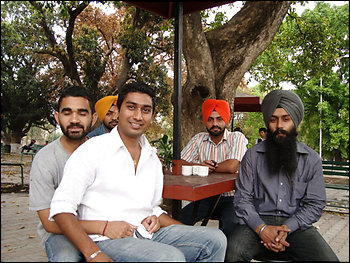 The story is hardly new. Every few weeks, we see reports by journalists that reinforce a well-known reality – many Sikh men in Punjab are cutting their hair and removing their turbans. I am hardly an alarmist. I do believe that despite the overwhelming trend, there are countercurrents as well. In an earlier post, I described what I have termed a ‘Sikh turn’.
The story is hardly new. Every few weeks, we see reports by journalists that reinforce a well-known reality – many Sikh men in Punjab are cutting their hair and removing their turbans. I am hardly an alarmist. I do believe that despite the overwhelming trend, there are countercurrents as well. In an earlier post, I described what I have termed a ‘Sikh turn’.
Although many Sikh youths have for the time being removed their turbans, their sense of a religio-ethnic identity still remains strong. Maybe the temptations of modernity and especially the desires of the opposite sex are strong and many feel that at this point in their life they would rather pursue women and cannot live up to the great ideals of their Gurus. This should not be read as a rejection of those ideals but a realization of where they are and their priorities at this time. (Though this may be the case of those that remove their pagri on their own account and not in those families and children where they never had it as many in the diaspora)
As discussed previously, the ‘Sikh turn’ is occurring. The psychological tragedy of the post-1993 Sikh community is beginning to wane and we may be witnessing the dawn of a new era. It may not be in the Khalsa symbolic form that many hope, but a religio-ethnic movement is occurring. The youth are not disinterested and disconnected; they are engaged and can be mobilized. The pull of the pagri is not dead in Punjab either as we see many Bihari migrants joining the Qaum’s ranks. This is a good sign. A new generation will soon have its own version of ‘pagri sambhal jatta.’[link]
A recent article in the Washington Post revisits the issue, highlighting a looming impending court case.
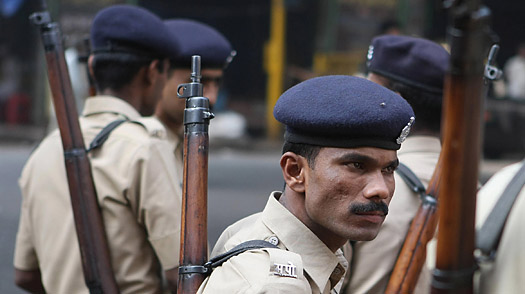
We recently posted on Ensaaf’s new report that studies the all too common practice of extra-judicial killings (usually referred to as ‘encounters’) and the mass cremations that followed by the Punjab police forces during the 1980s and 1990s. Well it looks like these practices were not limited to Punjab and these serious human rights violations are finally hitting the mainstream media.
This week, Time magazine writes about “Rights Groups Probe India’s Shoot-Out Cops“:
Scarcely a day passes in India by without news of an encounter between the police and criminals elements — “encounter” being the local jargon for shootouts involving the police, who are allowed to fire only in self-defense. On Wednesday, it was a “dreaded mafia don” who was gunned down by the Uttar Pradesh police — shot dead, and therefore unable to challenge the police account of the circumstances of the shooting. But some in India have begun to question the frequency of such “encounters”.
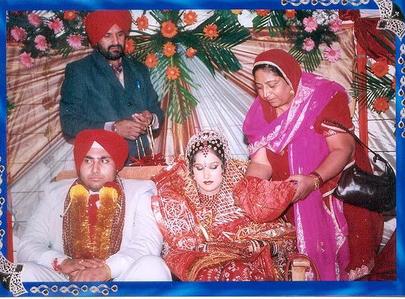
Pawandeep holds a framed photo of her sister. In the photo, Amandeep is wearing a pink salwar-kameez, a Punjabi dress. “She dreamed of a better life for herself and her family. All she wanted was to live happily with her husband and son like any other woman.”
I don’t even know where to begin with this story. The grisly facts of Amandeep Kaur Dhillon’s murder and her father-in-law’s arrest have been covered before, but this weekend, the Toronto Star’s Raveena Aulakh wrote a detailed story. You can read the full article here and it will break your heart, not just because of Amandeep Kaur’s tragic story, but because her story is all too common in our community.
Baldev Mutta knows the stories of immigrant women all too well.
The executive director of the Punjabi Community Health Centre in Brampton says hundreds of young Punjabi brides arrive in Canada every year. Many have arranged marriages. “They don’t know anyone, don’t have any support system and battle pressures most people can’t even imagine exist,” he said.
In the Punjabi culture, men are raised to be dominant while women are expected to be subservient. “The level of thinking of men in the Punjabi community leaves a lot to be desired,” said Mutta, a Punjabi himself. Mutta, who runs programs at four Sikh temples in Brampton, Rexdale, Malton and Oakville, and hosts a radio show, wishes he had been able to reach Amandeep.
Some women are so isolated that they are not allowed to have any communication even with their parents, said Kripa Sekhar, executive director of the South Asian Women’s Centre on Lansdowne Ave. in Toronto. “There are times when we get emails or phone calls from a woman’s family saying they haven’t heard from her ever since she came to Canada, can we check on her,” says Sekhar.In some cases women, bruised and beaten, have been locked up in their homes, not allowed to make or receive any calls. “It’s a problem women face everywhere, but what is unique among South Asians is that we don’t acknowledge it or want to talk about it.”
We can deny it all we want but here’s the sad reality for many (not all) Punjabi families:
(more…)
Just when you think that everything is hunky-dory for Sikhs in Canada, you hear of an incident like this that makes your cringe. Here’s a first-hand account of an incident that took place at the Toronto Raptors game last Friday night.
My brother, Gagandeep Singh Saluja and I, Simran Kaur Saluja attended a Raptors game at the Air Canada Centre on the night of Friday, January 30, 2009. I witnessed something which disturbed me tremendously. After a great night of getting two of the Raptors’ players to sign our jerseys and getting Jermaine O’Neal’s wristband, my brother and I make our way out to see the post-game show.
He tells me he has to use the washroom. Entering a public washroom is not unlawful in any way. I witnessed many people entering and exiting the same washroom my brother wished to use. A security guard approached my brother, out of all people as he is a visible minority that stands out. The security guard told my brother to get out. For what reason? Well, let me describe my brother to you all. He is a third-year student studying Business Management at UTSC and a proud Sikh youth who wears his turban with pride and joy…A huge Raptors’ fan as well. Gagan asks him “for what” while he tries to make his way to a stall and the security guard starts pushing him and saying “You don’t want to start with me!” He then calls back-up. Gagan finds himself with 4 to 5 security guards on him trying to kick him out. Police officers get involved during this time and start tackling him.
I sensed something wrong while I was standing outside watching the post-game show. I was hesitant in terms of if I should check on my brother in the washroom but I thought it wouldn’t be appropriate for me to do that. I decided to wait for him as I thought that the security guard had let him use the washroom. I wait for about 10 minutes for my brother…I was getting a bit edgy and started looking around for him. I had not seen anything.
Later, the security guard is out of breath and sweaty and attends to the location where I had seen him prior to the whole washroom catastrophe. I ask him “Aren’t you the one who was in the washroom?” He said “yeah.” He knew that I was there waiting for Gagan and after another 10 minutes he tells me, “You might want to make your way out as to whoever you were with is being arrested.” I race outside to find my brother without his turban on, in pain and suffering. When I saw his face…I don’t know how to explain such regret. I keep thinking to myself ‘had I gone into the washroom?! Maybe, just maybe they would not have used such force against him.’ I love my brother a whole lot and I never want to see him hurt. This whole ordeal that happened in Toronto, Canada out of all places is just sad.
Monday marked notable achievements in the human rights world, for Sikhs affected by the Indian government’s abuses in Punjab in the 80s and 90s, as well as in the arena of international criminal justice.
First, Ensaaf recently partnered with Benetech, a technology organization that has created data analysis software to measure whether documented human rights abuses occurred on a systematic, widespread scale or whether they were arbitrary. On Monday, Ensaaf and Benetech’s Human Rights Data Analysis Group (HRDAG) released their findings.
The report by Ensaaf and HRDAG, Violent Deaths and Enforced Disappearances During the Counterinsurgency in Punjab, India, presents empirical findings suggesting that the intensification of counterinsurgen
cy operations in Punjab in the early 1990s was accompanied by a shift in state violence from targeted lethal human rights violations to systematic enforced disappearances and extrajudicial executions, accompanied by mass “illegal cremations.” Indian security officials have dismissed claims of human rights violations as unavoidable “aberrations” during the counterinsurgency against alleged terrorists in Punjab from 1984 to 1995.
“This report challenges explanations by Indian security forces for enforced disappearances and extrajudicial executions using more than 20,000 records from independent sources which have been analyzed using statistical methods,” said Romesh Silva, a demographer at HRDAG and co-author of the report. “This scientific analysis reveals that answers given by the government regarding the nature and extent of these violations are implausible given the available evidence. The victims and their families have a right to the truth.” [ensaaf]

A Sikh gentleman has been involved in a Ontario Human Rights Tribunal matter relating to alleged discrimination against him for wearing a turban at work.
The case centers around treatment that this gentleman received at the hands of a Home Depot employee while posted by a third party security company to provide security detail for a Home Depot construction site. What is particularly disturbing about the allegations are the allegations of racial bias as the employee is alleged to have refused entry to Mr. Deepinder Singh Loomba but also to have stated that he had been successful in the past in not allowing any turbaned persons to work at his site.
Mr. Loomba is a well educated professional who has worked with international companies in other countries and had recently immigrated to Canada, working in security while he was getting settled here. He has decided to take up this case on account of what he saw as a racial bias and a refusal by a large retailer like Home Depot to recognize and deal with the bias. Mr. Loomba has been supported by the Ontario Gurudwara Committee and now needs your moral support.
After over a year of legal haggling he has his day in court and will be in hearings today and tomorrow at the Human Rights Tribunal of Ontario (located at 655 Bay St., 14th Floor, Toronto). The hearings started on Monday and will continue until Wednesday (three days) from 9.30 to 4:30 each day and are open to the public. Moral support and awareness would be appreciated – all the press we can get would also help to put some pressure on Home Depot to do the right thing.
All along Mr. Loomba has insisted that this outcome include an apology to the community and an acknowledgment by Home Depot that they need to implement more racial awareness and sensitivity training in the company. He has stuck this out for the good of the community and it would be great if people could show support and help him out at this crucial time in his case”
While driving yesterday I heard about an interesting news story on the local conservative talk radio station. Basically, the Mexican father of a 14 year old daughter was arrested by California authorities for selling his 14 year old daughter’s hand in marriage to an 18 year old man. Apparently in Oaxaca (pronounced Wa-ha-ka), a state in Mexico, such practice is normal.
Marcelino de Jesus Martinez, 36, of Greenfield, California, was arrested Monday and booked into the Monterey County Jail, Greenfield police said in a statement. He faces felony charges of receiving money for causing a person to cohabitate, police said.
Martinez had arranged through a third party to have his daughter marry the older teenager, identified by authorities as Margarito de Jesus Galindo, of Gonzales, California. In exchange, Galindo was to pay Martinez $16,000 and provide him with 160 cases of beer, 100 cases of soda, 50 cases of Gatorade, two cases of wine, and six cases of meat, Greenfield Police Chief Joe Grebmeier told CNN.
In the Oaxacan community, such an agreement is “normal and honorable,” he said. “In California, it’s against the law. [Source]
The story is interesting because the novelty of the situation seems to have forced people to actually think about what it means to be a melting pot or an integrated community.?The questions being asked on the?show?I was listening to were the same questions that are asked of Sikh religious practices: Where do we stop being accommodating and begin enforcing laws that protect people? How do we respect culture and enforce laws?
 In 2006, Kawaljeet Tagore was fired for refusing to remove her kirpan. This month, she has filed a lawsuit, along with the Sikh Coalition and Becket Fund, against the IRS.
In 2006, Kawaljeet Tagore was fired for refusing to remove her kirpan. This month, she has filed a lawsuit, along with the Sikh Coalition and Becket Fund, against the IRS.
Kawaljeet Tagore, a Sikh American, sued the Internal Revenue Service (IRS) in Houston federal court on Jan. 6 claiming the IRS discriminated against her by prohibiting her from wearing a kirpan, a mandatory article of faith, on her job as a revenue agent at the Mickey Leland Federal Building in downtown Houston. [link]
The case is significant for a few reasons, but this is the first time someone has litigated the right to wear the kirpan specifically in a work-context. There have been other incidents (and sometimes cases) in which a Sikh’s right to wear the kirpan in an educational setting or in a vehicle or place of public accommodation has been disputed and resolved.
